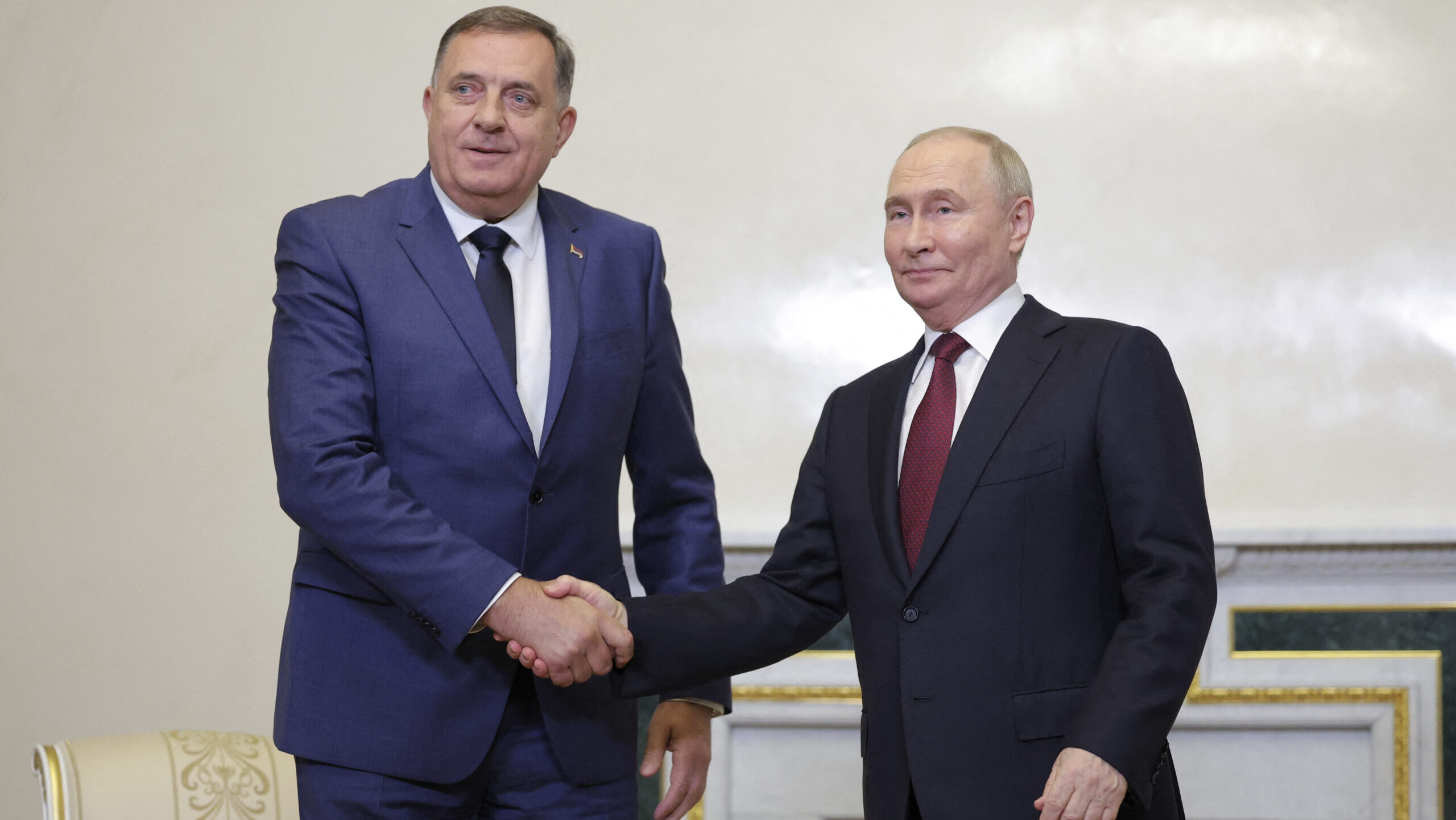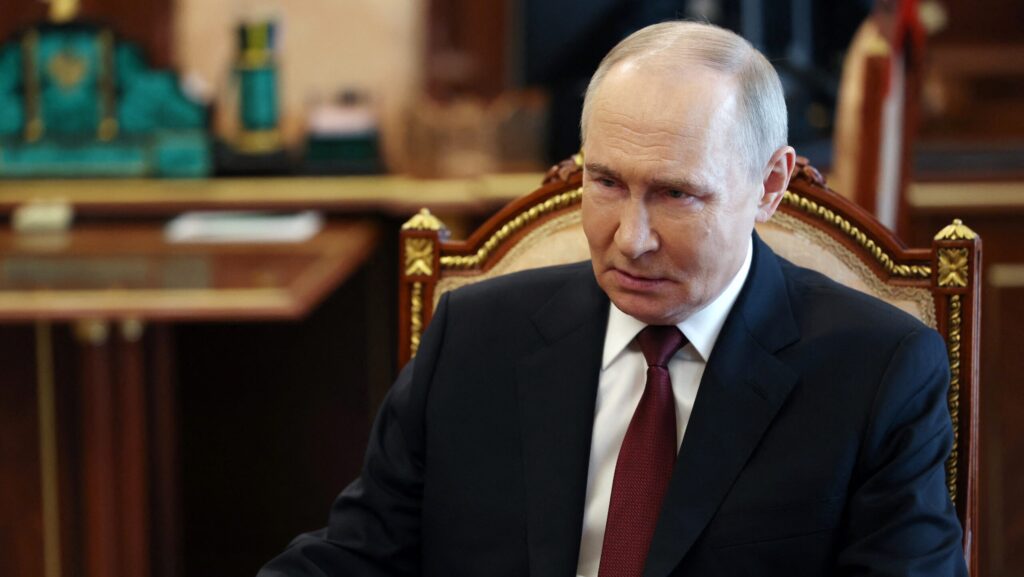Bosnian Serb leader Milorad Dodik is reportedly in Moscow, where he is expected to meet Russian President Vladimir Putin on Tuesday, 1 April, according to Bosnian and Serbian media outlets. Prior to his presumed arrival in Russia on Saturday, Interpol issued a ‘red notice’ for the President of Republika Srpska on 28 March. With ‘money on his head,’ Dodik has been playing—and continues to play—a game of catch me if you can with both international and Bosnian authorities, travelling to Serbia, Israel, back to Serbia, and then on to Russia despite the warrant issued against him.
‘I have arrived,’ Dodik wrote on his X account on Saturday, the first post hinting at his whereabouts since his departure from Israel on Thursday. According to two independent sources cited by the Bosnian outlet Klix Vijesti, Dodik is currently in Moscow, awaiting a meeting with Putin, a close ally of his.
A Fragile State in a Fragile Region
Bosnia and Herzegovina (BiH) was established by the Dayton Agreement in 1995, which ended the Bosnian War—part of the broader Yugoslav Wars of the 1990s, marked by widespread atrocities and war crimes committed by nearly all parties. Due largely to its artificial construction, BiH has faced persistent crises since its inception.
The country comprises two autonomous entities: the Federation of Bosnia and Herzegovina—primarily inhabited by Muslim Bosniaks and Bosnian Croats—and Republika Srpska (RS), where Bosnian Serbs form the majority. Each entity has its own legislature, judiciary, and executive authorities. At the federal level, governance is shared by a three-member Presidency of BiH, with one representative from each of the country’s three constituent nations. There are also federal judicial and legislative institutions. Above all stands the High Representative of the international community, a position currently held by Christian Schmidt. The high representative wields sweeping powers to impose or annul laws and to remove officials, including judges and democratically elected political leaders.
Dodik’s Road to Moscow
The current standoff intensified after Dodik was sentenced in February to one year in prison and barred from holding public office for six years, in what many regard as a politically motivated trial. His conviction was based on his refusal to comply with rulings issued by the high representative—an authority he does not recognize. Prosecutors largely disregarded the fact that Dodik acted in accordance with Republika Srpska’s constitution, relying instead on the high representative’s contentious powers.
In response to the conviction, Dodik and the RS National Assembly pushed for legislation aimed at curbing the influence of federal institutions over the entity. On 12 March a federal arrest warrant was issued against Dodik and two other senior Bosnian Serb officials, accusing them of undermining Bosnia’s constitutional order.
Defying the warrant, Dodik visited Serbia on 24 March to attend a ceremony marking the 26th anniversary of NATO’s intervention in the Yugoslav Wars. On 26 March he travelled to Israel to participate in a conference on combating antisemitism, organized by Israeli Diaspora and Antisemitism Minister Amichai Chikli.
However, his visit was cut short following the issuance of an international arrest warrant by the Court of Bosnia and Herzegovina on 27 March. According to Israel Hayom, after being informed of the warrant, Israeli officials advised Dodik’s team that he should leave due to diplomatic reasons. Notably, at that point, there was no Interpol warrant issued against him—that came a day later, on 28 March. It was then that he reportedly left the country, returning first to Belgrade and subsequently, according to media reports, travelling to Moscow.
‘Dodik's persecution is absolutely political in nature and is directed not only against him, but against all patriotic forces’
Dodik and Republika Srpska maintain close ties with Putin and Russia, largely due to traditionally favourable Serbian views of the country, with a 2024 survey by the International Republican Institute (IRI) showing that 94 per cent of Bosnian Serbs hold a favourable opinion of Russia. The Kremlin strongly condemned Dodik’s sentencing in February, warning that it could have destabilizing consequences for the region. ‘Dodik's persecution is absolutely political in nature and is directed not only against him, but against all patriotic forces,’ Kremlin spokesperson Dmitry Peskov stated.
The Bosnian Serb leader had cancelled a previous trip to Moscow, scheduled for 19 March, without providing official reasons. However, media reports now suggest he is eager to meet President Putin on Tuesday. At the time of writing, neither party has officially confirmed the meeting.
What Drives Dodik?
The current chaotic situation places Hungary—known for its pragmatic relations with both BiH and RS—in a difficult position. Hungarian Prime Minister Viktor Orbán condemned Dodik’s conviction, sparking outrage in Sarajevo and resulting in a diplomatic standoff between BiH and Hungary. Due to Orbán’s close relationship with Dodik, the European Parliament fears that potential EU sanctions against the Bosnian Serb leader may be vetoed by Hungary at the Council level.
Nonetheless, Dodik is already subject to sanctions imposed by the United States. At the onset of tensions in early March, Secretary of State Marco Rubio issued a statement asserting that Dodik’s actions were undermining BiH’s institutions and threatening the country’s security and stability.
‘We are...not interested in living in a country where our identity is erased, and our people are blamed for everything’
In response, Dodik stated that he firmly believes nation-building efforts—along with the artificial maintenance of unviable political constructs—are relics of the failed foreign policy of the Biden administration, a chapter he believes President Donald Trump will inevitably bring to an end.
In a recent interview with The Jerusalem Post during his visit to Israel, the Bosnian Serb leader discussed the motivations behind separatist ambitions. ‘We are...not interested in living in a country where our identity is erased, and our people are blamed for everything,’ he said, adding: ‘The world needs to understand: There is no peaceful coexistence where one side is always expected to apologise.’ He described Sarajevo as a ‘hub of Islamic influence,’ accusing Bosniak leaders of maintaining ties with Iran and enabling the spread of radical ideologies. ‘Antisemitism is allowed to thrive’ in parts of Bosnia, he explained.
Related articles:








